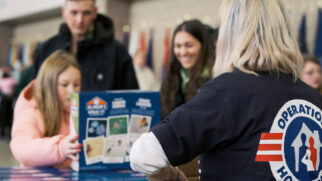When parents doing the best they can to raise their kids need advice, they may consult friends and family, books and blogs, pediatricians and podcasts. The quality of the advice depends on the provider. Authors and doctors may offer professional credentials or even scientific evidence to support their guidance, with or without firsthand knowledge. Siblings and coworkers may base their suggestions on little more than good intentions.
That’s why some of the best advice may come from experienced mothers who are bringing up high achievers, such as the Military Child of the Year® recipients. Raising military children involves some unique challenges, including frequently changing schools, doctors and communities.

Jessica McGrath, whose older son, Alexander, was the 2017 Navy Military Child of the Year Award recipient, has learned a lot about parenting from her family’s experience moving more than seven times. She and her husband, Navy Capt. Richard McGrath, also have a son in seventh grade, Zachary. Alexander is finishing his first at Yale University, and has arranged a summer internship with a member of the British Parliament’s House of Commons.
Jessica recommends some ways parents can help their children succeed:
• Be involved in their lives. “The biggest thing is to be an engaged parent,” Jessica said. “It kind of sounds clichéd, but it is very specific to the military child because … of moving so often …” It might be all right for parents who live in the same community for 10 years or more to go on “autopilot” once the child has established friends and activities, she said, but military families face a different situation. As much as possible, research schools, pediatricians and neighborhoods to find the best fit for your child.
For kids who do not handle moving as well, it is even more important to be tuned in, she said. Whenever possible, talk with them about what’s going on. Help them facilitate change if necessary because you may not have time for the issue to resolve itself. “You don’t have that gift of years of time in that one duty station.”
• Act as your child’s advocate. “You need to be an advocate for your child, but that can be very positive. It doesn’t have to be an advocate in a complaining sense,” Jessica said.
For example, advocating for your child might mean being aware of and familiar with the Interstate Compact on Educational Opportunity for Military Children, which requires states to ensure military kids have the same access to success as civilians, and are not penalized or delayed in achieving their educational goals. The compact addresses issues such as graduation requirements, records transfer and course placement.
It boils down to “making your child feel safe and happy and healthy in a new environment,” she said. Asking them “how can I help you learn to do it yourself?”
• Tap into the local and military communities. “For a military child to be successful, it’s bloom where you’re planted,” Jessica said. They and their parents may not have had much, if any, control over where they moved, but they can make the most of what a community offers. “For this to really work though, you need support” from both the immediate family and the wider military family at the base or post. “You encourage them to get involved in this new community that you’re in,” whether that’s volunteering, joining teams or clubs, scouting, or whatever interests the child.
Getting involved helps the military children themselves, both in the moment and for future success, but also helps pave the way for other military children, she said. If they set a good example, it makes it that much easier for the community to accept the next military children who come along.
Jessica said another way to join the community is to take advantage of the wealth of information available among military families, and when appropriate, offer your own experiences. “Whatever it is you’re going through, someone has already done that.” In rural areas, Facebook groups of military families and spouses can be especially helpful, with members sometimes offering solutions within 20 minutes of posting. “I have always been amazed by the support,” she said.
• Provide continuity. Continuing scouting, swimming, dance or other activities in each new community can help a child adapt, and gives a way to get to know kids who may become friends. An “anchor place,” somewhere you can return periodically, also helps. For the McGraths, it has been a family cabin in Maine. It could be a grandparent’s home, a friend’s place or just a favorite town.
• Model how to take the initiative. “Lead by example,” she said. “We see a problem and you just fix it.” If someone needs assistance, your attitude should be “I don’t even know you, but let me drop what I’m doing and help you because I was there” too at one time. For example, Jessica and another spouse stepped in to take over the ombudsman’s responsibilities when that person became ill and had to bow out. The ombudsman is the liaison between the squadron and the ship’s command.
• Teach that actions have consequences, and you control your actions. Whether it’s their own actions or someone else’s, decisions have a larger effect. “That’s, I think, the ultimate learning experience,” Jessica said. “You’re empowering them.” If a student at school got in trouble, talk about factors that may have contributed. Discuss empathy. If a friend got into college, discuss the many steps that led to that good news.
• Develop a positive relationship with your kids. Jessica said if she has a parenting super power, it’s probably investing the time required for closeness and easy rapport with her sons. “They feel comfortable taking to me, and telling me their problems but also their successes, and us working together as a team.”
• Realize that no two children are the same. You can strengthen a child’s attributes, and they each have their own individual qualities. Alex finds and pursues his own opportunities with tenacity. She doesn’t find them for him. But she did teach him social skills, and to always be polite, which helped him interact in ways that led to positive outcomes. “He has this inner drive that I didn’t give him,” she said. “My gift was maybe getting your foot in the door.”
• Focus on the positive. Jessica acknowledges that the moving process itself isn’t always fun, but says the pros can outweigh the cons. “It builds your character, it builds resiliency. You become a better person, and basically, that sets you up to be a very successful adult.”
Meeting various challenges gives you strength to draw upon, teaches you what works and what doesn’t, and even gives you good conversation starters, she said. “Non-military kids don’t always get that opportunity, which I actually think is a blessing to learn and grow.”
• Take care of yourself. Explore classes at local community colleges. Jessica, who graduated in 1991 with a bachelor’s degree in management and retail buying, has worked in her field, but also reinvented herself numerous times. She worked for a company that sells mutual funds and insurance, for an attorney and for the Navy Exchange. She volunteered in advocacy for military families, helping with family readiness groups and CORE, or Continuum of Resource Education, which provides seminars and volunteers dedicated to enriching Navy spouses and families. Later, Jessica discovered a love for art and took classes in metalsmithing and photography. She is now a designer at the Baltimore Jewelry Center.
Richard McGrath, a former Navy pilot, is a professor of operations research at the Naval Academy.
Aside from being personally proud to see Alexander’s hard work pay off when he received the MCOY award, Jessica said it was even more special and meaningful knowing that he represents many other military children, “validating their breadth of experience, the resiliency of the military child.” Alex is friends with another 2017 MCOY award recipient, Henderson Heussner, who also attends Yale. Jessica said she’s glad the two of them share a common bond and background from their military upbringing.
“Just to see what a military child can accomplish is such an amazing, rewarding thing,” she said. “I love Operation Homefront and everything that they do.”

Thank you to our presenting sponsor United Technologies for making the Military Child of the Year Award program possible. We’re also grateful to the following additional sponsors: Booz Allen Hamilton, Procter & Gamble, Microsoft, MidAtlantic Broadband, La Quinta Inn & Suites, Veterans United Home Loans, Under Armour, Tutor.com and Military Times.




